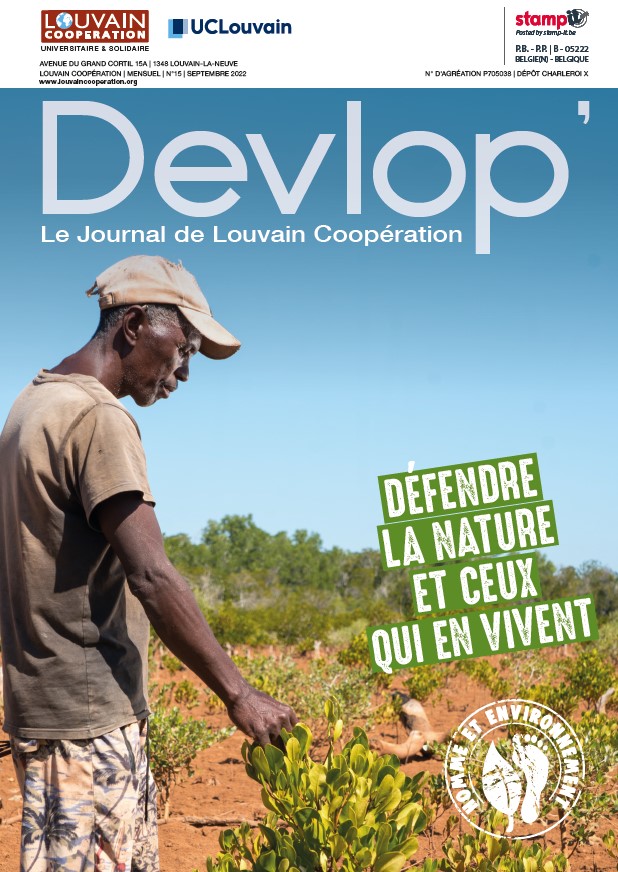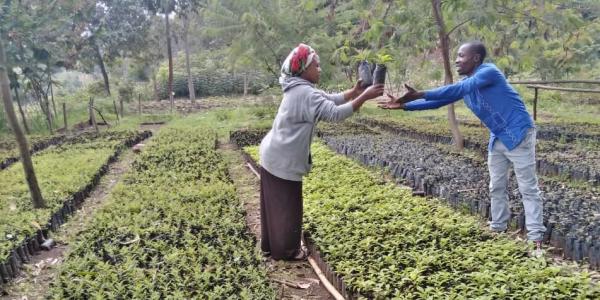
Edito
Safeguarding the environment and human activities
Environmental issues are now becoming increasingly important in development projects. This is not a choice, but a necessity, an obligation, an urgent matter. Even more so than here, the impacts of climate change are disrupting daily life, particularly for people in the Global South. Farmers, fishermen, herders... all these men and women who depend on nature for their livelihoods are watching it rebel with a sense of helplessness and concern.
Much of the work to be done lies with us, in revolutionising our habits. If we want to take action elsewhere, then we must do so properly. It is not a question of imposing our vision of environmental conservation on the Global South. It is essential that we work with our partners and the communities concerned to understand their needs and develop sensible and effective actions.
Can a person's life be measured in hectares of forest? In the number of rare animal and plant species? We refuse to make that choice. The only possible path for us is to seek a balance between protecting the environment and human activities, between conserving natural resources and ensuring dignity for those who depend on them.
In this challenge, we can count on the expertise of our local partners, UCLouvain and local universities. These invaluable allies enable us to constantly challenge, rethink and innovate in our actions and in the quest for a fairer and more sustainable world.
Louvain Coopération is taking part in a vast project for the restoration and sustainable management of mountainous agricultural ecosystems in South Kivu, initiated by the FAO (United Nations Food and Agriculture Organisation). The programme covers the territories of Kabare and Walungu, in the vicinity of the Kahuzi Biega National Park. Its aim is to improve development opportunities in the Democratic Republic of Congo through the sustainable exploitation of natural resources, as well as reforestation and the sustainable, community-based management of these resources.
During recent decades, deforestation in the DRC has increased considerably, from 0.17% per year between 1990 and 2000 to 0.52% between 2010 and 2014 (FAO, 2017). "There can be no rain without forests, but all the forests here in South Kivu are disappearing. The province is ranked sixth in the country in terms of deforestation and degradation, with 16,500 hectares per year", explains Olivier Matumaini, our SAD (Sustainable Food Systems) Project Manager in the DRC.
People are suffering from the economic crisis and the exploitation, sometimes illegally, of timber (wood and charcoal) and non-timber forest resources has become a source of income for some households. Today, the park is one of the rare ecosystem areas that has been relatively preserved from deforestation. We believe that its presence here contributes to the little rain we still get. The Kahuzi Biega National Park is an important ecosystem to protect, with rare characteristics in terms of biodiversity."
The role of Louvain Coopération within this project is to develop, with the people living near the park, profitable alternative economic activities that promote the restoration of forests and landscapes, and that can replace the income they earn from logging. 70 projects led by micro-enterprises in the fields of agriculture, livestock farming, handicrafts and agroforestry have been selected. The participants have already been trained, and they will receive funding and technical support to set up their economic activity. In the medium term, these micro-projects will also contribute to the restoration of the environment through reforestation, the protection of reforested areas, the improvement of community incomes and the use of agro-ecological techniques.
For a number of years, Louvain Coopération has made environmental protection one of its key concerns. The difficulty of ecological projects lies in finding a balance between preserving a fragile natural environment and maintaining economic activity for local populations.
Today, the environmental dimension is present in every project we undertake. The challenge is twofold: to preserve natural resources that are vital for the planet and for biodiversity, but also to maintain a healthy environment and a productive natural environment for those who live and work there. But very often, preserving an environment and the resources it contains means a loss of income, at least in the short term, for its inhabitants. This loss can be catastrophic for families who find themselves in a state of permanent food and economic insecurity.
We therefore need to innovate and think about alternatives that can best preserve each stakeholder, including the natural components of an environment.
In all the areas in which it operates, Louvain Coopération supports men and women farmers. The general aim is to improve living conditions for families, by working to diversify and increase harvests and related income, but also to structure cooperatives or sectors.
To achieve this, we rely on the co-creation and exchange of knowledge, through model farmers or farmer field schools and training courses dedicated to sustainable farming techniques with an agro-ecological approach. Composts, plant improvers, erosion control, crop rotations and combinations, agroforestry... all these techniques enable farmers to improve their yields and diversify their food supply, while preserving the land that sustains them. By producing their own seeds and organic fertilisers, they save a lot of money and gain greater autonomy.
Mangrove forests develop in wetlands, at the interface between sea and land. They are a bulwark against the winds and waves, but also a breeding ground and nursery for thousands of animal and plant species. For their inhabitants, they are a reserve of wood essential to the construction of houses and canoes, but also a larder for those whose survival depends on fishing. On a global scale, they are a veritable lung, capturing up to ten times more CO2 per hectare than a conventional forest.
Thirty years ago, the island of Madagascar was bordered by 310,000 hectares of mangroves, i.e. 20% of African mangroves. Since the 1990s, climate change and massive deforestation have destroyed more than 80,000 hectares of these forests: 25% of Madagascar's mangroves have disappeared.
Louvain Coopération is working to preserve and restore these precious forests, particularly in the Menabe region. We support the local authorities who are responsible for protecting the forests, we encourage the communities and support them in setting up reforestation campaigns and temporary fishing reserves, i.e. areas where fishing is prohibited for a few months in order to ensure the reproduction of fish and other animal and plant species. In addition, we are supporting mangrove dwellers, most of whom are fishermen, in developing other sources of income in order to reduce and limit the degradation of mangroves and, more broadly, natural resources.
From 2017 to 2021 in the Menabe region, more than 100 hectares of mangroves have been reforested, with more than 482,000 propagules (mangrove seedlings) planted. 2,630 residents have been made aware of the need to preserve natural resources by taking part in collective reforestation campaigns.
Another aspect of our work on mangroves is the collaboration with the other university NGOs that are members of the Uni4Coop consortium, which are also working to preserve them, but in other countries. The aim is to pool the experience and knowledge gained from our projects, our universities and local stakeholders in order to guide our actions as effectively as possible and make them as impactful as possible.
The Environmental Integration Tool Approach, also known as the "OIE" Approach, is a system designed to effectively and systematically integrate the environment into all Louvain Coopération projects linked to food and economic security. It is based on questionnaires covering soil, water and air quality, as well as biodiversity, waste, energy and the ability of local players to integrate the environment into their activities. They provide a precise description of the state of the ecosystem before, during and after the project, as well as identifying the influences of the project on the environment and vice versa.
Thanks to these observations, objectives and actions are formulated by the micro-entrepreneurs and producers supported, as well as by our teams working in the field, and are translated into concrete commitments in favour of the environment. This approach was born ten years ago and has come a long way since then. At the end of 2020, the DGD (Directorate-General for Development Cooperation and Humanitarian Aid) chose it as the benchmark to be used by Belgian NGOs "to ensure a better understanding of expectations and focus structured attention on environmental issues."
The next project is to digitise one of the specific tools of the Approach. For the time being, it still takes the form of a paper questionnaire to be completed by producers with the help of technicians who visit the villages. Digitising it would make it easier to use, disseminate more widely and compile the objectives and results for use in scientific research.
Receive
the full version
of the Devlop' newsletter
News / Videos - Find out more...


